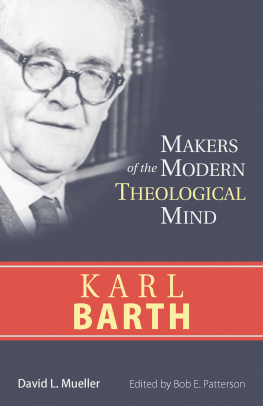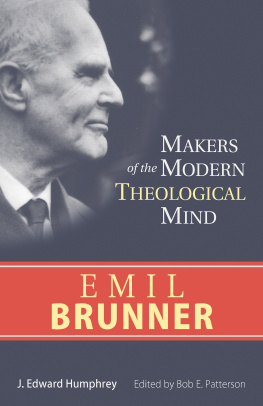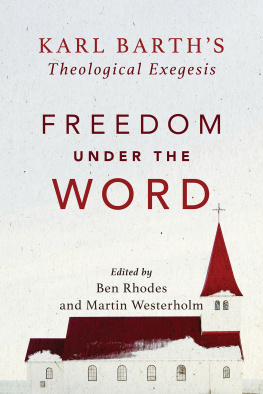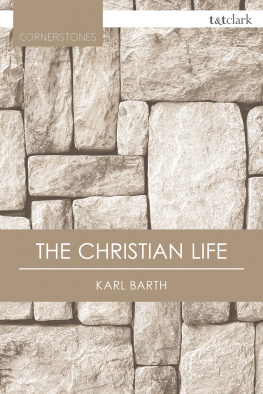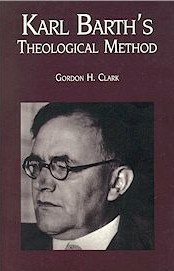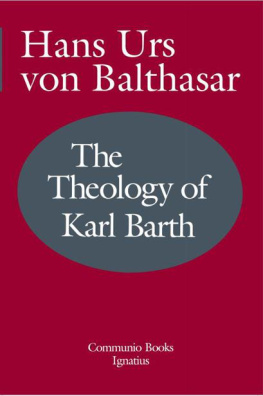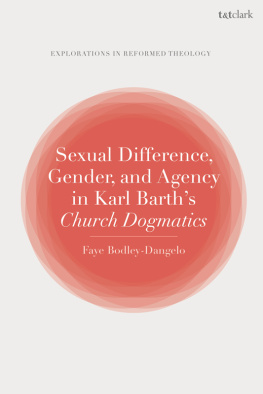While readers may notice that some word choices and writing styles are dated, we chose to leave the original text intact in order to preserve the historical integrity of the books. Additionally, although the series represents a specific perspective in modern Western thought, these theologians nevertheless serve as forerunners to the many outstanding theological voices we hear in todays much broader perspective. It is for their sake and the sake of new generations that we are reprinting this series, thereby ensuring continued accessibility to these formative and important modern theologians.
Another unique feature of this series is that many of the authors studied with the particular theologian about whom they wrote. And because some of these books were written almost half a century agopublished during the political and social turmoil of the latter decades of the twentieth centurythey also serve as historical accounts of how these theologians impacted the authors at the time that they themselves were writing.
We are confident that readers will continue to find these books interesting and useful, which is why we are releasing them with a new look and in paperback and also as e-books. As these theologians continue to influence the global church, this series remains a helpful overview of their historical context and their lifes work.
Editors Preface (1972)
Who are the thinkers that have shaped Christian theology in our time? This series tries to answer that question by providing a reliable guide to the ideas of the men who have significantly charted the theological seas of our century. In the current revival of theology, these books will give a new generation the opportunity to be exposed to significant minds. They are not meant, however, to be a substitute for a careful study of the original works of these makers of the modern theological mind.
This series is not for the lazy. Each major theologian is examined carefully and criticallyhis life, his theological method, his most germinal ideas, his weaknesses as a thinker, his place in the theological spectrum, and his chief contribution to the climate of theology today. The books are written with the assumption that laymen will read them and enter into the theological dialogue that is so necessary to the church as a whole. At the same time they are carefully enough designed to give assurance to a Ph.D. student in theology preparing for his preliminary exams.
Each author in the series is a professional scholar and theologian in his own right. All are specialists on, and in some cases have studied with, the theologians about whom they write. Welcome to the series.
BOB E. PATTERSON, EDITOR
BAYLOR UNIVERSITY
Authors Preface
During the period from 1932 to 1967 Barth published thirteen volumes of his Church Dogmatics totaling over 9000 pages in German! Obviously, it is quite presumptuous to write a brief introduction to the thought of a theologian who may be called a modern Church Father. Nevertheless, the attempt has been made. Whether the most important things which ought to go into such an introduction have been said and whether the analysis is reliable are for others to judge.
It is not possible to survey the entire Church Dogmatics in one small volume. Therefore, after an analysis of Barths early development, major attention is accorded the doctrine of revelation, which bears upon everything else Barth writes. The third chapter is an analysis of some aspects of Barths christocentric theology. The conclusion is an assessment of both some of the strengths and weaknesses of Barths theology.
Throughout, it is my intention to interpret Barth fairly. Numerous quotations are used in order to provide the reader with something of the flavor of Barths method and style. In most instances, I have used the official English translation of the Church Dogmatics. Though I have profited from reading some of Barths critics, limitations of space precluded much dialogue with them. A Protestant, Thomas F. Torrance, and a Roman Catholic, Hans Urs von Balthasar, have been the most helpful interpreters of Barth with respect to his theological method and the transitions in his pilgrimage. My hope is that this work will whet the readers appetite to the extent that he will read Barth on his own.
My father, William A. Mueller, was the first to introduce me to Barths thought. In the early thirties, he wrote a doctoral dissertation dealing with the dialectical theology of the early Barth; some twenty-five years later (1958), I completed a doctoral dissertation at Duke University dealing with Barths theological method. During the year 195960, I took a leave of absence from Baylor University in order to pursue post-graduate studies at the University of Basel in Switzerland. I am indebted to the J. Newton Ravzor Foundation for providing a grant which helped make that venture possible. The courtesies which Professor Barth extended me and the frequent contacts with him which seminars and colloquia made possible during that year will not be forgotten.
This book is dedicated to three people who shared in the joys of that year in Basel. Mr. and Mrs. Charles E. Thompson, my wifes parents, visited us in Basel and shared in the excitement which marked participation in one of the English colloquia chaired by the grand old man of Basel, Karl Barth. My wife Marilyn enriched the time we spent together in Basel and our common pilgrimage in the intervening years.

